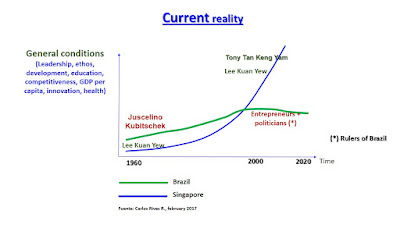Brazil and
Singapore. Some counterfactually data.
Currently,
when compared to the many indices that academic or business organizations
present each year to measure country performance (competitiveness, innovation,
education, and others) Singapore always appears in the top 10 places while
Brazil occupies positions over the number 60. A curious detail: Singapore never
appears on conventional maps because it is so small that to be seen, the maps
should be the size of the Wailing Wall (Jerusalem). Brazil is a giant 12,000
times bigger and is visible from space.
Let's
look at some facts: The Global Competitiveness Index, developed and published
annually since 1979 by the World Economic Forum, shows in the report of
2015-2016 to Switzerland in the number 1 position, Singapore the 2 position.
Brazil is in 57th position. The competitiveness index measures the ability of
countries to provide high levels of prosperity to their citizens. This ability
depends on how a country uses its available resources. As a result, the index
measures a set of institutions, policies and factors that define the levels of
sustainable economic prosperity today and in the medium term.
In
the Global Talent Competitiveness Index 2017 (published by INSEAD, Adecco) the
locations are: Switzerland (1), Singapore (2) Brazil (81). In the Human
Development Index (UN-UNDP) the locations are: Norway (1), Singapore (11),
Brazil (75).
The
Innovation Index 2015 (INSEAD, Cornell University, WIPO) includes Switzerland
(1), Singapore (7), Brazil (70). Singapore is overtaken by USA, UK, Finland,
Sweden for obvious reasons.
Does
this mean that everything in Brazil is bad or mediocre? No, there are islands
of excellence that unfortunately are surpassed by the immense political and
business mass that seeks the easy and sinuous way to fulfill their vicious
ends. The universities of Brazil are the best in Latin America, the academic
quality is respectable, there are important companies. But it's not enough.
Was
the situation always bad in Brazil? At what point did the course go? Juscelino
Kubischeck), president between 1955 and 1961, proposed to overtake the country
in 50 years, so began with a daring and visionary decision, the creation of
Brasilia as a new capital. The work of Lucio Costa and Oscar Niemeyer show us
this great vision. In 1961, astronaut Yuri Gagarin who visited Brasilia said:
"I have the feeling of landing on a different planet, not on earth"
(El Comercio, April 21, 2010, Houses: 6).
With
Kubischeck, everything, the vision, the dream and the ambition to be a great
country ended. Today Brazil is just a gigantic territory, nothing more; A
clumsy giant who falls and drags others with him. With Kubischeck, the will of
greatness, the ambition, was over.
By
contrast, Lee Kuan Yen had the clear vision from the beginning. At the same
time that Kubischeck projected 50 years onwards, having everything at hand (a
large territory, resources, a large population) Kuan Yew also projected, with
nothing (practically with one hand behind and another forward). The difference
is that he had the support of a people who shared their shortcomings and
desires, their fears and ambitions, and that they had to choose between winning
or dying. That took Singapore to where it is now.
What
does Singapore have? I only mention some decisive factors. Leadership, the
communion of the people with the leader, the intentionality. Lee Kuan Yew left
for eternity in 2015, although he left the government before, but the
successors did not dedicate themselves to distribute the loot, continue with
his legacy, the new generations maintain the vision and spirit of greatness.
The
following chart shows some current facts referring to Singapore and Brazil. In
the vertical axis the general conditions that are expressed in indicators are
represented; It is appreciated that Singapore is always above and that since
2000 Brazil has stagnated or declined notoriously.
Drawing
on the imagination, let's look at some counterfactual details: What would have
happened if Lee Kuan Yew, continuing Kubischeck's vision, would have been the
leader of Brazil and the people would have shared their mission, and would have
been willing to follow the rules, fleeting present for the future? The result
would have been very impressive perhaps and Brazil would be one of the five
world powers. If Kuan Yew had been alone, he would have given the same name as
Joao, Pele, Kaka or Zeze, and the country would have always been on the path of
mediocrity.
In
the opposite case and only after 1980, what would have happened, if Singapore
fell into the hands of the groups that now govern Brazil? It would have
disappeared from the map, they would have seen the first bidder and Singapore
would again be the brothel, the brothel passing through those distant seas, as
it was before Kuan Yew became indignant and decided to create a respectable
society.
We
must thank God because Singapore now exists, because it serves as a model for
countries like Peru, who have everything but do not dare to make the leap, not
the step, the leap to be great (and without using the false door as it is intends
to join the OECD).






